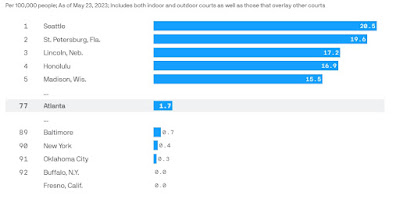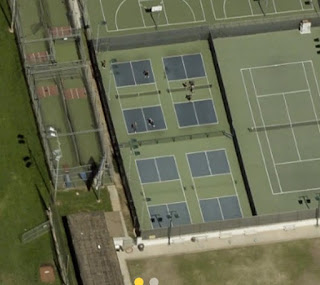The number of public pickleball courts in the 100 largest U.S. cities has experienced a remarkable sixfold increase since 2017, rising from 420 to 2,788. However, municipal leaders assert that they are still far from meeting the demand from pickleball enthusiasts, often referred to as "pickleheads."
According to the Trust for Public Land (TPL), there is now approximately one pickleball court for every 24,000 residents in these cities. This statistic highlights the love/hate relationship that cities have with pickleball. While the sport is embraced by players transitioning from tennis and those attracted to its unique appeal, it also generates constant complaints from displaced tennis players due to noise and the usurpation of their courts. Pickleball injuries are also becoming a problem.
Cities are facing the challenge of constructing courts fast enough to keep up with demand. They are resorting to various means, such as utilizing COVID-19 relief funds and municipal bonds, to secure the necessary funding. Even cities with colder climates are actively building dedicated pickleball courts or converting tennis courts for dual use. TPL's list of U.S. cities ranked by pickleball courts per capita reveals that Seattle, where the sport originated on Bainbridge Island in 1965, holds the top spot.
Surprisingly, Lincoln, Nebraska ranks third on the list, with the city's parks and recreation facilities manager attributing it to the dedication of local snowbirds who developed a passion for pickleball in Phoenix and successfully advocated for court construction in their hometown. St. Paul, Minnesota, ranked sixth on the list, also claims the second spot on TPL's ranking of the best U.S. cities for public parks.
TPL's top 10 pickleball cities include warm-weather locations like St. Petersburg, Florida (second place), Honolulu (fourth), and Plano, Texas (seventh). However, they also feature colder cities such as Madison, Wisconsin (fifth); Omaha, Nebraska (eighth); Boise, Idaho (ninth); and St. Louis, Missouri (tenth). Notably, no cities in the Northeast or California made the top 20, with Washington, D.C. ranking 23rd and Riverside, California ranking 29th.
According to Will Klein, associate director of parks research at TPL, the cities with well-established park systems tend to have a substantial number of pickleball courts. These cities also tend to rank highly in terms of overall health, encompassing both mental well-being and physical activity levels.
A case study of Lincoln, Nebraska reveals the introduction of pickleball in 2016 when a group of retirees returned home for the summer and collaborated with the city to refurbish underutilized tennis courts for pickleball. The retirees formed a nonprofit organization called Pickleball Lincoln Inc. and successfully raised private funds to build six courts. The popularity of the courts was evident from the beginning, prompting further fundraising efforts to construct four additional courts.
However, tensions arose between tennis players and pickle ballers in the Lincoln area, leading to a summit meeting and the development of a master plan for outdoor racket sports. Conflicts over court availability persist, with one side claiming that their preferred sport dominates the courts. J.J. Yost, planning and facilities manager for Lincoln Parks & Recreation, humorously remarks on the frequency of pickleball-related discussions in the city.
According to Carl Schmits of USA Pickleball, the sport's governing body, there is a significant shortage of pickleball courts compared to the number of tennis courts. With 23 million tennis players and 9 million pickleball players in the United States, there should ideally be 37 pickleball courts for every 100 tennis courts. However, the current numbers stand at around 250,000 tennis courts and 44,000 pickleball courts recorded in USA Pickleball
Using Satellite AI Image Recognition To Find Courts?
Enter into the business world, Pickleheads. A startup that recently unveiled its latest technology platform for pickleball players and announced a successful round of fundraising. As the first venture capital-backed tech company exclusively focused on America's fastest-growing sport, Pickleheads aims to revolutionize the pickleball experience.
Pickleheads provides a user-friendly platform that enables pickleball players to effortlessly locate nearby courts and connect with fellow enthusiasts. Recognizing the rapid ascent of pickleball as the country's fastest-growing sport, the company anticipates its continued surge in popularity, aiming for pickleball to become one of the largest sports in America. In 2022 alone, over 36 million Americans engaged in pickleball, utilizing more than 10,320 facilities across the United States.
During the previous autumn, the startup quietly secured pre-seed funding from prominent investors including Ardent Venture Partners, Overline, and Boardroom Pickleball, which counts Kevin Durant and Rich Kleiman among its backers.
Sean O'Brien, Managing Partner at Overline, expressed enthusiasm, stating, "The pickleball market is enormous—it is the fastest-growing sport in the country, yet no company has emerged as a leader in this space. We firmly believe that Pickleheads possesses a unique opportunity to claim that leadership role and we are excited to support them on their journey."
Pickleheads initially introduced its court finder feature last summer and have since established itself as the go-to source for comprehensive court information. Thousands of players rely on the platform daily to discover nearby courts, connecting the pickleball community like never before.
With the release of its scheduling and group management tools today, Pickleheads seeks to simplify the task of pickleball organizers in response to the skyrocketing demand. The new tools empower organizers to create schedules for individual courts, manage signups, and even oversee waitlists.
Max Ade, CEO and co-founder of Pickleheads highlighted the current lack of technology in the pickleball space and the unprecedented surge in interest the sport is experiencing. He stated, "Pickleball is witnessing an unprecedented surge in interest, but there is a noticeable absence of technology in this domain. We are constructing a digital hub for pickleball players, starting with tools to locate courts and organize gameplay. Our recent funding will fuel our growth and support our ambitious technology roadmap."
Based in Atlanta, the startup envisions a future where its technology extends beyond its current offerings. The Pickleheads roadmap includes plans for flex leagues, an instructor marketplace, and other tools aimed at enhancing the pickleball experience on and off the court.
Co-Founder Brandon Mackie affirmed, "We are systematically building the premier online destination for pickleball players. Our mission is to facilitate easier connections and enrich the enjoyment of the sport they love."
Phil Bronner, Co-Founder at Ardent Venture Partners, expressed confidence in Pickleheads' potential, stating, "Pickleheads is a distinctive platform that fosters community engagement within this space. We firmly believe that its experienced, passionate founders and world-class tech stack will position it as the leading operating system for pickleball."
Pickleheads is a startup dedicated to developing technology for pickleball players, organizers, and facility owners. The company's suite of tools simplifies the process of finding local courts and organizing pickleball gameplay. Pickleheads was founded by a team of three seasoned entrepreneurs: Max Ade, Brandon Mackie, and Ian Langworth.
Can satellite images be used to find residential pickleball courts? This will change the home residential real estate market. Here is an interesting chart found that found mentions of "pickleball" in MLS databases in Sacramento.





